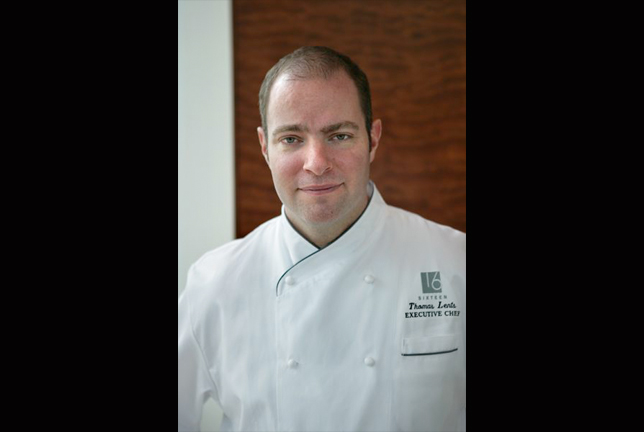
Sixteen, aptly named for its location on the 16th floor of Trump International Hotel & Tower Chicago, hired a new executive chef, Thomas Lents. Since Lents started in January, he’s been busy revamping the Four-Star restaurant’s menu. We chatted with him about his plans for Sixteen, his food philosophy and what it was like working in Chicago’s Everest and Las Vegas’ Robuchon.
What changes are you bringing to Sixteen?
I think what we’re going to be doing with Sixteen is trying to buck the trend of a kind of a catalyzation of fine dining. While we want it to be approachable and an experience that people can enjoy on a regular basis, we definitely want to continue to push what can be done with luxury food in a great setting that’s comfortable for everyone but also allows people to really experience the finest ingredients and techniques that we can produce.
What will the new menu be like?
We’re going to offer two different menus. We’re going to offer a smaller tasting menu — it’s going to be about seven courses of all reasonably small portions. It’s important to me that the portion sizing isn’t too large on my tasting menus. People get a chance to taste a couple different things, but it’s not overwhelming. I don’t want people to leave overfull. Then we’re also going to have a larger tasting menu that’s going to be 12 courses. This is going to be really more of the Sixteen experience — you’re going to get a chance to see the best of what we can do.
What’s your food philosophy?
It basically breaks down to two things:
1. I think it’s vital that you source and find the finest products that you possibly can. For me, that means not just buying local. I think you start looking locally. You find the best products that are available locally. But then you also plan on sourcing not only just in the rest of the United States but as much of the world as you can. I’ve had the good fortune to work with a lot of small producers from all over America and Europe. And I plan being able to bring those products here to Sixteen.
2. Then it’s finding the best technique that we have in the kitchen to showcase that ingredient. I don’t believe in attempting to make something different than what it is. It’s not my goal to make an apple look like an orange. My goal is to make an apple taste more like an apple. You should highlight the greatest elements of the finest ingredients that you can.
What have you learned working with highly acclaimed chefs?
I think each one of them taught me something different. I don’t want to copy any of the people that I worked with, but I think you emulate certain characteristics you might take from them. Like working with Mr. [Joël] Robuchon. His focus and dedication to the details of what it takes to make great cuisine is something that’s legendary. And it’s something that I hope to even come remotely close to. The man is a laser beam of focus — and all the time. His philosophy is that you take all of the effort to make something perfect, but it shouldn’t appear that way when it goes out to the guest. It shouldn’t look like it’s overfussed. It shouldn’t be that technique triumphs the dish. The dish should go out and have a natural appearance. It’s your technique that just makes it better. You don’t flaunt your technique.
What other chefs do you look to for inspiration?
I think in Chicago, at least, we have such a great fraternity of chefs. When I left here about eight years ago, there was a level of established chefs in town — chef Charlie Trotter, chef Jean Joho, etc. And now coming back, I really look to and draw inspiration from my peers. We have a great group of young successful chefs here, and some of them have been here for quite a while, like Paul Kahan and Grant Achatz. But then there’s a lot of guys I’ve worked with at Robuchon who have started in Chicago, like Anthony Martin at Tru, Matt Kirkley at L2O, Ryan LaRoche at NoMI and all those guys who I’ve worked shoulder to shoulder with in the past. I think we look to each other for inspiration. If it’s not inspiration, it’s competition. I think we’re pushing each other. And that’s the best — when your peers are your inspiration, I think that’s when you’re really going to push yourself to truly create and develop great things.
